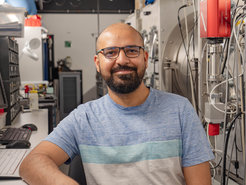“I like the cross-disciplinary nature of my research”
Meet our doctoral candidate Faran Irshad!

From training as a fighter pilot to delving into electrical engineering and finally transitioning into the world of physics, our doctoral candidate Faran Irshad’s path has been very diverse. As part of the IMRPS-APS since 2020, the researcher from Pakistan is pursuing his doctoral studies in the group of Prof. Stefan Karsch at the Centre for Advanced Laser Applications. Learn more about his research, his motivations and his PhD experiences in this interview.
What is your research about?
My research is geared towards trying to make a next generation of accelerators cheaper and more compact. Specifically I am trying to use machine learning methods to automatize a laser wakefield accelerator. A significant finding has been my machine learning code being able to optimize and tune the accelerator by itself without human input.
What is a laser wakefield accelerator?
A laser wakefield accelerator is a new concept where a highly intense laser pulse (10^18 W/cm^2) is sent into a gas (e.g Hydrogen). Because the laser pulse is so intense it ionizes the gas and turns it into a plasma. Moreover, it acts like a snow plough and pushes aside all the electrons of the plasma from its path. These electrons them come back to laser axis once the laser has passed. This sets up a wave behind the laser pulse similar to a wave behind a boat on a lake. Then we put some electrons in this wave and this allows them to be accelerated. So this is a novel technique to build a particle accelerator and this technology would hopefully shrink the giant accelerators that we currently have (LHC, SLAC).
Why did you choose to pursue your PhD in this field?
I had already worked in this field during my Masters and the ultra high intensity lasers seemed like a very exotic field for me. I also saw multiple medical applications for this technology and was naturally inspired to make tangible impact in people’s lives.
What do you enjoy most about your research?
I like the cross-disciplinary nature of my research. It has bits and pieces of plasma physics, laser physics, accelerator physics and machine learning. It keeps me on my toes to keep learning new stuff.
What is the most important thing you have learned in your PhD so far?
Perseverance is key to achieve what you want. There were stages in my PhD early on where I doubted that my methods would work. It just took a lot of time to iron out all the little problems and I only got through it because I kept trying.
What impact did the IMPRS-APS have on you?
The largest impact was the amazing people that I got to meet during IMPRS-APS events. IMPRS also supported and enabled me to contribute to different conferences and I loved the different workshops that targeted the soft skills that PhDs in Physics or hard sciences often lack.
Is there anything that has stood out to you in your IMPRS-APS experience so far?
My first meeting at Ringberg was quite nice since it was snowing when we arrived. The history of the castle was also quite interesting and the workshop by Alexander Schiller on "Managing your doctoral project" was a cherry on the top.
What skills or experiences gained during your PhD do you think will be most valuable in your future career?
As physicists we are trained to have an eye for detail which I think is quite an important skill to have. Apart from this some of the things I learned from the machine learning side would definitely help me. Breaking down a problem into digestible portions is another important skill.
What advice would you give to someone just starting their PhD?
I would say be curious and embrace learning and don't be afraid to make mistakes since that is a part of your journey as a researcher.
How is life in Germany/Munich for you?
It is amazing. I love Munich since it is so close to nature and that is something that I enjoy a lot. I try to go into the mountains in the south as often as I can. The city has such a calmness to it. Everything is very “proper” if I must say, maybe something to do with how bavarians are. :P
What’s a fun fact about you, a hobby or something else that you enjoy outside research?
I love baking or making different desserts, playing table tennis, reading book, going into the mountains, spending some time surfing tech news, building gaming PCs myself. Also a little fun fact about myself: I was actually being trained during my high school to become a fighter pilot for my country's airforce but then at the end I decided to not do it and eventually landed here.
Thank you for the interview!


